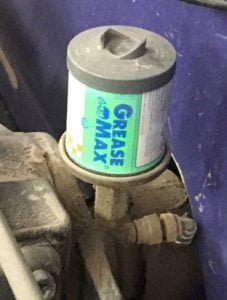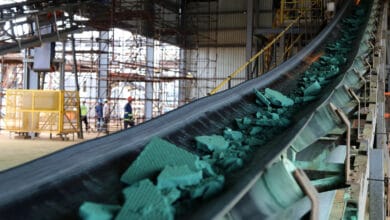Finding hardened grease in a housing opened for inspection is common. This is usually an indication of a more serious problem than just a messy clean-out task.
The causes of this are generally not well understood. Hardened grease is indicative of lubrication problems that can be avoided with an efficient lubrication method and the correct lubricant.
Hardening can occur rapidly or gradually over a long period of time, depending on the cause. As the grease hardens it causes increased friction, and as a consequence, heat. As the heat rises the grease problems escalate and the hardening process continues. The problem self-compounds. It will probably be noticed that the bearing is running hotter than normal and that there is a lubrication problem. Attempts to alleviate the problem by re-greasing can actually add to the problem once the grease has reached a condition of deterioration such that hardened grease is caked in the bearing.
The main causes, not in any order of likely occurrence, are:
- Grease incompatibility: Mixing incompatible greases will lead to oil separation and grease hardening.
- Contamination: Dirt, dust, ash and similar contaminants in the grease not only cause elevated rates of bearing wear but can also act as thickeners in the grease; both lead to higher friction levels and therefore elevated temperatures.
- High temperatures, particularly in excess of the grease’s drop point, will lead to oil loss from

GreaseMax lubricators effectively prevent grease hardening. separation and evaporation, causing grease hardening. Excessive temperatures may also cause the oil to oxidize and transform into a thick tar-like substance.
- Over-greasing, mechanical stresses from misalignment and overloading, and under-greasing will all cause elevated temperatures in the bearing. Excess temperature may cause the drop point to be reached, separation of the oil from the grease and lubricant failure. Over-greasing will lead to churning which causes even more heat, and probably lubricant failure. When these problems occur the end result is that the grease will harden.
- Loss of oil which occurs as a result of mechanical forces imposed by the bearing rolling elements on the grease. The oil is squeezed from the grease base and in some circumstances the grease base may not fully recover and totally re-absorb the oil. This can lead to gradual grease hardening. Spherical roller bearings are more prone to creating this problem than other bearing types.
- Constant pressure applied to grease can cause it to separate. Care needs to be taken with the grease used in lube systems as some greases are more prone to separation under these conditions than others.
- Continuous vibration and centrifugal force are causes of oil separation and grease hardening. In both cases the correct lubricant must be selected to ensure that the effect is minimised.
GreaseMax lubricators provide efficient, cost-effective, continuous lubrication. They effectively prevent grease hardening and the problems that it creates.









